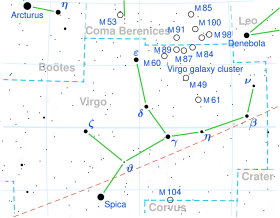Pi Virginis
| Observation data Epoch J2000 Equinox J2000 | |
|---|---|
| Constellation | Virgo |
| Right ascension | 12h 00m 52.39042s[1] |
| Declination | +06° 36′ 51.5571″[1] |
| Apparent magnitude (V) | 4.64[2] |
| Characteristics | |
| Spectral type | A5 V[3] |
| U−B color index | +0.12[2] |
| B−V color index | +0.12[2] |
| Astrometry | |
| Radial velocity (Rv) | −10.4[4] km/s |
| Proper motion (μ) | RA: +0.26[1] mas/yr Dec.: −30.10[1] mas/yr |
| Parallax (π) | 8.49±0.39 mas[1] |
| Distance | 380 ± 20 ly (118 ± 5 pc) |
| Absolute magnitude (MV) | −0.70[5] |
| Orbit[6] | |
| Primary | π Virginis A |
| Companion | π Virginis B |
| Period (P) | 282.69 days |
| Semi-major axis (a) | 3.55 mas |
| Eccentricity (e) | 0.265 |
| Inclination (i) | 62.71° |
| Longitude of the node (Ω) | 149.34° |
| Periastron epoch (T) | 2448281.3906 |
| Argument of periastron (ω) (secondary) | 312° |
| Semi-amplitude (K1) (primary) | 26.20[7] km/s |
| Details | |
| π Vir A | |
| Mass | 2.2[7] M☉ |
| Radius | 1.5[8] R☉ |
| Surface gravity (log g) | 3.51[9] cgs |
| Temperature | 8,000[9] K |
| Rotational velocity (v sin i) | 71[3] km/s |
| Other designations | |
| BD+07°2502, FK5 1311, HD 104321, HIP 58590, HR 4589, SAO 119164[10] | |
| Database references | |
| SIMBAD | data |
Pi Virginis (π Vir, π Virginis) is a binary star in the zodiac constellation of Virgo. It is visible to the naked eye with an apparent visual magnitude of 4.64.[2] The distance to this star, based upon parallax measurements,[1] is roughly 380 light years.
This is a spectroscopic binary system with a stellar classification of A5V. They have an orbital period of 283 days with an eccentricity of 0.27.[7] The mass ratio of the two stars is about 0.47, with the primary having an estimated mass of around 2.2 times that of the Sun. The primary is a cool metallic-lined Am star.[9]
References
[edit]- ^ a b c d e f van Leeuwen, F. (November 2007), "Validation of the new Hipparcos reduction", Astronomy and Astrophysics, 474 (2): 653–664, arXiv:0708.1752, Bibcode:2007A&A...474..653V, doi:10.1051/0004-6361:20078357, S2CID 18759600.
- ^ a b c d Mermilliod, J.-C. (1986), "Compilation of Eggen's UBV data, transformed to UBV (unpublished)", Catalogue of Eggen's UBV Data, Bibcode:1986EgUBV........0M.
- ^ a b Royer, F.; et al. (February 2007), "Rotational velocities of A-type stars. III. Velocity distributions", Astronomy and Astrophysics, 463 (2): 671–682, arXiv:astro-ph/0610785, Bibcode:2007A&A...463..671R, doi:10.1051/0004-6361:20065224, S2CID 18475298.
- ^ Evans, D. S. (June 20–24, 1966), Batten, Alan Henry; Heard, John Frederick (eds.), "The Revision of the General Catalogue of Radial Velocities", Determination of Radial Velocities and their Applications, Proceedings from IAU Symposium no. 30, vol. 30, University of Toronto: International Astronomical Union, p. 57, Bibcode:1967IAUS...30...57E.
- ^ Anderson, E.; Francis, Ch. (2012), "XHIP: An extended hipparcos compilation", Astronomy Letters, 38 (5): 331, arXiv:1108.4971, Bibcode:2012AstL...38..331A, doi:10.1134/S1063773712050015, S2CID 119257644.
- ^ ESA (1997). "The Hipparcos and Tycho Catalogues". VizieR On-line Data Catalog. Bibcode:1997yCat.1239....0E.
- ^ a b c Ducati, J. R.; et al. (January 2011), "The mass ratio and initial mass functions in spectroscopic binaries" (PDF), Astronomy and Astrophysics, 525: 9, Bibcode:2011A&A...525A..26D, doi:10.1051/0004-6361/200913895, hdl:10183/99264, A26.
- ^ Pasinetti Fracassini, L. E.; et al. (February 2001), "Catalogue of Apparent Diameters and Absolute Radii of Stars (CADARS) - Third edition - Comments and statistics", Astronomy and Astrophysics, 367 (2): 521–524, arXiv:astro-ph/0012289, Bibcode:2001A&A...367..521P, doi:10.1051/0004-6361:20000451, S2CID 425754.
- ^ a b c Paunzen, E.; et al. (February 2013), "A photometric study of chemically peculiar stars with the STEREO satellites - II. Non-magnetic chemically peculiar stars", Monthly Notices of the Royal Astronomical Society, 429 (1): 119–125, arXiv:1211.1535, Bibcode:2013MNRAS.429..119P, doi:10.1093/mnras/sts318, S2CID 119231581.
- ^ "pi. Vir -- Spectroscopic binary", SIMBAD Astronomical Database, Centre de Données astronomiques de Strasbourg, retrieved 2016-09-16.


 French
French Deutsch
Deutsch